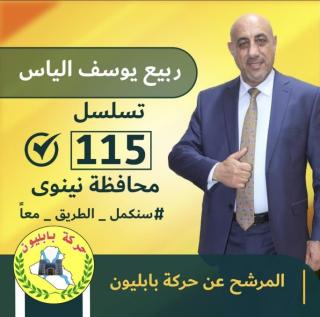Babiliyoun Movement Hijacks All Four Christian Minority Seats
A group led by U.S.-sanctioned figure Rayan al-Kildani escaped accountability from Iraqi Christian communities by abusing the courts and buying non-Christian votes.
Iraq's December 18 provincial elections saw a clean sweep of all four allocated Christian seats by U.S.-sanctioned human rights abuser Rayan al-Kildani. The outcome was engineered by his Babiliyoun Movement, an arm of Kataib Babiliyoun (KB), the 50th Brigade of Iraq's Popular Mobilization Forces (PMF).
The four quota seats are traditionally reserved for Iraqi Christians in the provinces of Basra, Baghdad, Kirkuk, and Nineveh. Although the intention of this allocation is to ensure Christian representation in these provincial councils, Iraqi election law allows anyone, Christian or not, to vote for these seats. This loophole has enabled Iranian-affiliated parties to hijack the reserved seats by mobilizing mostly Shia Arab voters behind the Babiliyoun Movement.
Going into the elections, the Babiliyoun Movement was looking to win local seats in these provinces for the first time, matching its success in the past two parliamentary elections. Despite warnings from independent parties and activists regarding the movement's increasingly successful vote-buying campaign, the Iraqi government did not take any action to prevent Babiliyoun from thwarting the intended purpose of the Christian seats. Some Christian activists argued that the movement was planning to take all four seats, while others believed that Babiliyoun would be wary of a clean sweep for fear of causing further backlash within the Christian community.
Ultimately, Kildani and Babiliyoun did go for a sweep, albeit belatedly. The movement won the seats for Baghdad, Nineveh, and Kirkuk outright, but in Basra, the church-backed independent candidate Fahram Haig Ignatius won initially. The day after the results were announced, however, plaintiffs hurriedly brought a legal case linking Ignatius to the outlawed Baath Party, thereby disqualifying him from the position under Iraq’s de-Baathification laws. The seat then defaulted to Babiliyoun's candidate, Nael Ghanim Sako, giving the group complete control over Christian quota seats in Iraq’s provincial councils.
Kildani, Kataib Babiliyoun, and the Babiliyoun Movement continue to grow in strength and confidence. They have overridden long-brewing Cristian fury toward them by exploiting the federal structure of the PMF and the corrupt judiciary. Suddenly "discovering" the alleged Baathist background of a democratically elected Christian candidate and using it to install a militia-backed candidate is a clear example of electoral and judicial corruption—one that begs for investigation by both the U.S Congress and American organizations focused on religious freedom, democracy, and anti-corruption efforts.








